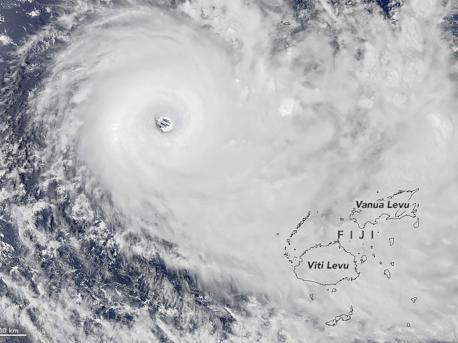
Tropical Cyclone Yasa Hits Fiji
UNICEF will work with the Government of Fiji to respond to the urgent needs of children and families caught in the path of the second major tropical cyclone to hit the region this year.
Tropical Cyclone Yasa made landfall on December 17 in Bua, Vanua Levu, Fiji at 6 PM local time, with wind speeds of 149 mph. This is the second time this year that the Fiji archipelago has had a direct landfall from a major tropical cyclone.
Thousands have fled their homes; many communities have been cut off from assistance due to flooding
Thousands have fled their homes; more than 23,000 people remain in evacuation centers. Roofs have been torn off, houses flattened, crops ruined and trees and powerlines downed. Many communities have been cut off from assistance due to flooding and the destruction of roads. The Government of Fiji has declared a "State of Natural Disaster" for the next 30 days to respond to the crisis.
“We will work with our government, civil society and other partners to provide clean water, and emergency health and education supplies for children in affected communities.”
— UNICEF Pacific (@UNICEFPacific) December 18, 2020
- Sheldon Yett, UNICEF Pacific Representative.https://t.co/ljZLLLAH3e
“We will work with the government, civil society and other partners to provide clean water, and emergency health and education supplies for children in affected communities,” said Sheldon Yett, UNICEF Pacific Representative.

UNICEF delivered emergency supplies to help children and families in Fiji affected by Tropical Cyclone Harold in April 2020. © UNICEF/UNI323703/
UNICEF has prepositioned essential supplies to augment the emergency supplies of government ministries. These include water, sanitation and hygiene items, emergency health and midwifery kits, basic drugs, medical supplies and equipment, along with basic supplies to support learning and to help children regain a sense of normalcy as soon as possible after the disaster.
UNICEF prepositioned essential emergency supplies to help those affected by the storm
"UNICEF has been working with the national disaster authorities to make sure of their local evacuation center," Cate Heinrich, UNICEF Pacific chief of communications said from Suva, Fiji's capital, in the hours before the storm hit. "A simple text message or phone call can save people's lives."
The response to the cyclone is particularly challenging due to the global COVID-19 pandemic, which is hindering the movement of people and supplies. This cyclone will deal another blow to the economy and the people already hurt by the economic slowdown brought by the pandemic.
Top photo: Tropical Cyclone Yasa made landfall in Bua, Vanua Levu, Fiji at 6 PM local time on December 17, 2020. © NOAA
HOW TO HELP
There are many ways to make a difference
War, famine, poverty, natural disasters — threats to the world's children keep coming. But UNICEF won't stop working to keep children healthy and safe.
UNICEF works in over 190 countries and territories — more places than any other children's organization. UNICEF has the world's largest humanitarian warehouse and, when disaster strikes, can get supplies almost anywhere within 72 hours. Constantly innovating, always advocating for a better world for children, UNICEF works to ensure that every child can grow up healthy, educated, protected and respected.
Would you like to help give all children the opportunity to reach their full potential? There are many ways to get involved.



